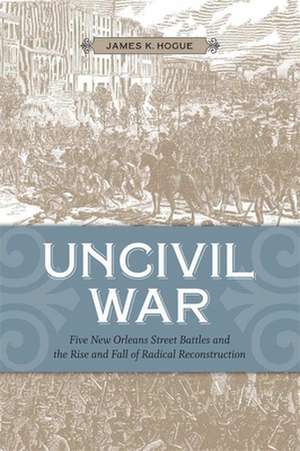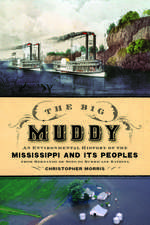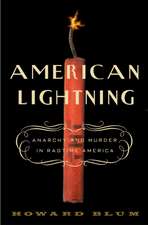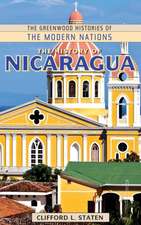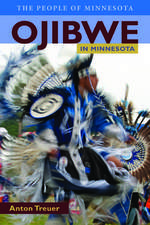Uncivil War: Five New Orleans Street Battles and the Rise and Fall of Radical Reconstruction
Autor James Keith Hogueen Limba Engleză Paperback – 31 oct 2011
No other Reconstruction state government was as chaotic or violent as Louisiana's, located in New Orleans, the largest southern city at the time. James K. Hogue explains the unique confluence of demographics, geography, and wartime events that made New Orleans an epicenter in the upheaval of Reconstruction politics and a critical battleground in the struggle for the future of southern society. No other Reconstruction state government was as chaotic or violent as Louisiana's, located in New Orleans, the largest southern city at the time. James K. Hogue explains the unique confluence of demographics, geography, and wartime events that made New Orleans an epicenter in the upheaval of Reconstruction politics and a critical battleground in the struggle for the future of southern society.
Hogue characterizes Reconstruction in Louisiana as a continuation of civil war, waged between well-organized and well-armed forces vying to control the state's government. He details five key New Orleans street battles, in which elite Confederate veterans played central roles, and gives an in-depth account of how the Republican state government raised militias and a state police force to defend against the violence. In response, a white supremacist movement arose in the mid-1870s and finally overthrew the Republicans. The occupation of Louisiana by federal troops from 1862 to 1877 was the longest of its kind in American history. Not coincidentally, Hogue argues, one of the longest unbroken periods of one-race, one-party dominance in American history followed, lasting until 1972.
Uncivil War reveals that the long-term military impact of the South's occupation included twenty-five years of crippled War Department budgets inflicted by southern congressmen who feared another Reconstruction. Within Louisiana, the biracial Republican militias were dismantled, leaving blacks largely unarmed against future atrocities; at the same time, the nucleus of the state's White Leagues became the Louisiana National Guard, which defended the "Redeemer" government's repressive labor policies. White supremacist victory cast its shadow over American race relations for almost a century.
Moving between national, state, and local realms, Uncivil War demystifies the interplay of force and politics during a complex period of American history.
Preț: 248.82 lei
Nou
47.61€ • 49.84$ • 39.40£
Carte tipărită la comandă
Livrare economică 05-19 aprilie
Specificații
ISBN-10: 0807143618
Pagini: 227
Dimensiuni: 150 x 226 x 15 mm
Greutate: 0.39 kg
Editura: Louisiana State University Press
Textul de pe ultima copertă
"In his astute, well-written analysis of five street battles between 1866 and 1877, Hogue makes a persuasive case that the conflict in the Crescent City represented a continuation of the Civil War by other means." -- Journal of American History
"James Hogue has produced a well-written and fully documented account of Louisiana during the tumultuous Reconstruction period." -- Journal of African American History
The violent power struggle in the Louisiana state government between the end of the Civil War in 1865 and the demise of Reconstruction in 1877 sets the stage for James K. Hogue's Uncivil War. The Union's victory left vague both the reintegration of ex-Confederate states and the status of freed slaves in postwar society -- sparking internal violence and resulting in Federal military intervention. According to Hogue, by a unique confluence of demographics, geography, and wartime events, New Orleans became a political epicenter and a critical battleground.
Setting himself apart from other historians, Hogue contends that Reconstruction-era violence in the postwar South, particularly in Louisiana, evolved into a new civil war rather than intermittent massacres or race riots. In reality, clashing forces were increasingly well-organized, well-armed, and focused on winning control over or defending internal governments -- fitting, as Hogue points out, the classic definition of civil war.
James K. Hogue is an associate professor of history at the University of North Carolina, Charlotte, and co-author, with James M. McPherson, of Ordeal by Fire: The Civil War and Reconstruction, fourth edition.
